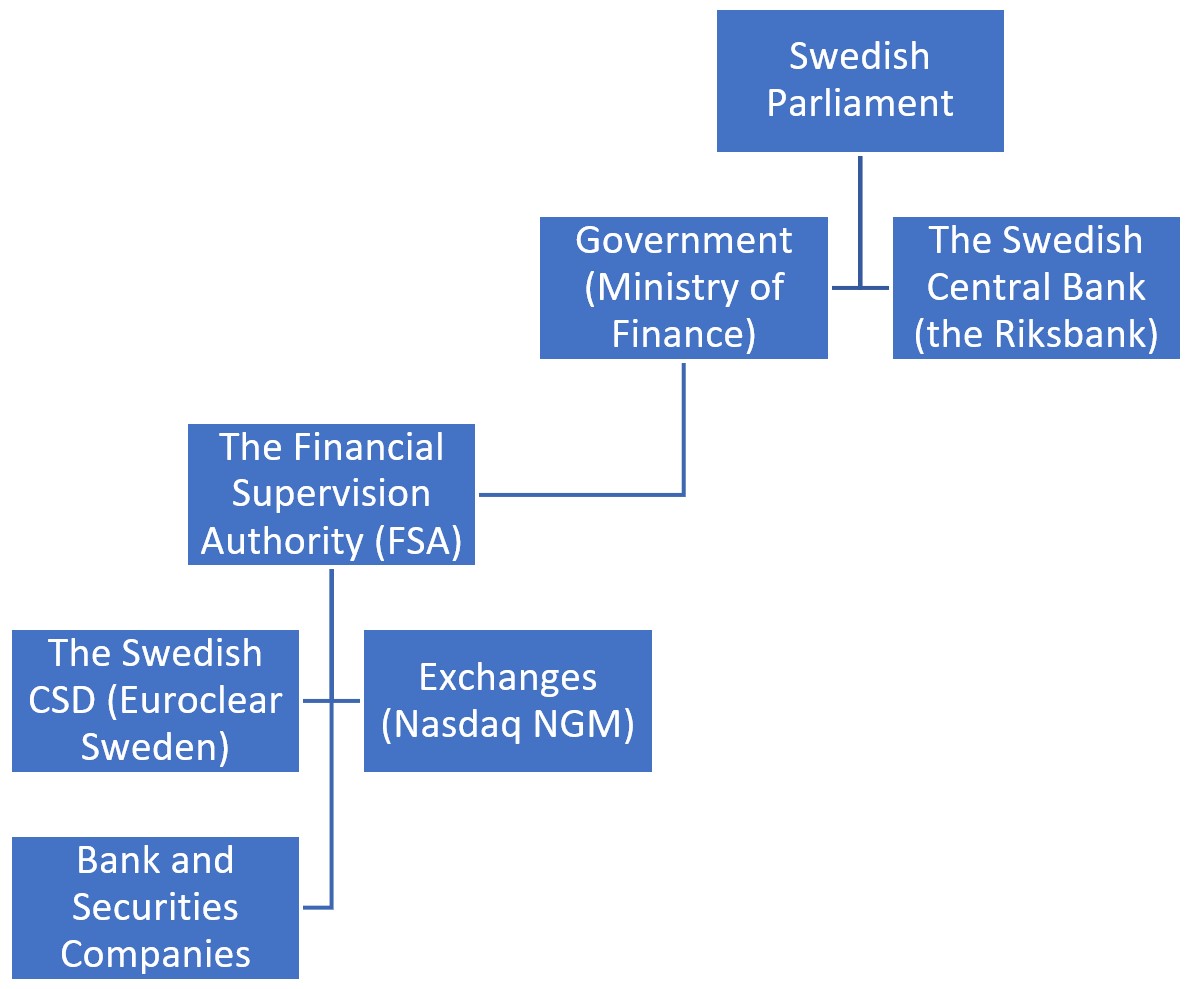Market infrastructure – Sweden
Institutions and organisation
Swedish Parliament
The Swedish Parliament is the highest legislative body in Sweden. It establishes and amends the legislation that governs the financial market. The Parliament, however, does not actively supervise the market. Finansinspektionen (Swedish Financial Supervisory Authority, hereinafter referred to as the Swedish FSA) supervises the Swedish market. It is a central governmental regulatory and supervisory authority accountable to the Ministry of Finance. The role of the Swedish FSA is to promote stability and efficiency in the financial system as well as to ensure an effective consumer protection. The Swedish FSA authorises, supervises and monitors all companies operating in the Swedish financial market.
Stock exchange – Nasdaq Stockholm AB (www.nasdaqomxnordic.com)
Nasdaq Stockholm AB is part of Nasdaq Nordic together with Nasdaq Copenhagen, Helsinki and Iceland. It is the main marketplace for Swedish securities (that is, equities, equity rights, convertible loans, subscription options, premium bonds, retail bonds, ETFs and warrants).
In addition to the main market, Nasdaq Nordic also operate a Multitrading Facility (MTF), First North Sweden. First North Sweden is an MTF designed for small and growing companies. Derivatives are traded and cleared through a separate legal entity, Nasdaq Clearing AB.
Exchange trades are cleared, settled and registered (in book-entry form) at the Swedish Central Securities Depository, Euroclear Sweden.
CSD – Euroclear Sweden AB (www.euroclear.com/sweden/en.html)
The Swedish Central Securities Depository (CSD) is Euroclear Sweden AB which is owned by Euroclear SA/NV. Euroclear Sweden is given authorisation as a CSD in accordance with the Central Securities Depositories Regulation (EU) No 909/2014 and is under the supervision and examination of the Swedish FSA. It is the CSD in Sweden, where securities are de-materialised and kept in book-entry form, and it is responsible for the Swedish securities settlement system. Euroclear Sweden’s main operations consist of three parts: registration, clearing operations and account holding.
Main legal framework regulating Euroclear Sweden:
- The Central Securities Depositories Regulation (EU) No 909/2014
- The Central Securities Depositories and Financial Instruments Accounts Act (1998:1479)
- The Securities Market Act (2007:528)
- The Settlement Systems Act (1999:1309)
- Euroclear Sweden’s General Terms and Conditions Account Operations and Clearing
- Euroclear Sweden’s Rules for Issuers and Issuer Agents
Euroclear Sweden has an insurance coverage via specific policies within the Euroclear Group. The insurance covers fidelity, operational errors, errors and omissions, computer fraud, business continuity disruption, securities in custody or in transit and asset loss.
Regulatory structure
Financial supervisory authority (FSA) – Finansinspektionen (www.fsi.se)
The Swedish FSA is responsible for the supervision of institutions in the financial markets in Sweden.
Important Swedish statues currently in force in relation to the Swedish securities markets:
- The Financial Instruments Trading Act (1991:980)
- The Deposit Insurance Act (1995:1571)
- The Central Securities Depositories and Financial Instruments Accounts Act (1998:1479)
- The Act (1999:158) on Investor Compensation Scheme
- The Settlement Systems Act (1999:1309)
- The Mutual Funds Act (2004:46)
- The Banking and Financing Business Act (2004:297)
- The Market Abuse Penalties Act (2005:377)
- The Companies Act (2005:551)
- The Takeover Act (2006:451)
- The Capital Adequacy and Large Exposures Act (2006:1371)
- The Securities Market Act (2007:528)
- The Money Laundering and Terrorism Financing (Prevention) Act (2009:62)
- The Act (2013:561) on Alternative Investment Funds Managers
- EU Market Abuse Regulation (Supplemental Provisions) Act (2016:1306)
- The Sveriges Riksbank Act - Central Bank (2022:1568)
- The Screening of Foreign Direct Investment Act (2023:560)
The Swedish FSA in its regulatory code (FFFS), and Myndigheten för samhällsskydd och beredskap (the Swedish Civil Contingencies Agency) in its regulatory code (MSBFS) in case of the FDI Act (as defined below), publishes complementary rules in the form of regulations that are binding and general guidelines.
Central bank – Sveriges Riksbank (www.riksbank.se)
The Swedish central bank, Sveriges Riksbank (the Riksbank), is an authority under the Swedish Parliament. It is responsible for monetary policy with the objective to maintain price stability. The Riksbank has also been given the task to promote a safe and efficient payment system. The payment system and the supplying of credit play a central role in ensuring the economy functions efficiently. The Riksbank oversees the financial infrastructure in order to promote financial stability the Swedish market. (This responsibility is shared with the Swedish Financial Supervisory Authority, Swedish National Debt Office and the Government through the Ministry of Finance.) The Riksbank applies the CPSS and IOSCO principles for financial infrastructures. In accordance with the CPSS and IOSCO principles, monitoring takes place in that the systems assess themselves, and also in that the Riksbank carries out an in-depth analysis of specific risks in the system. If the analysis indicates shortcomings in safety or efficiency in a system, the Riksbank encourages the system to rectify them.
National debt office – Riksgälden (www.riksgalden.se/en/)
The Swedish National debt office (SNDO), Riksgälden, is the Swedish government’s financial administration, a public authority responsible to the Ministry of Finance. The main tasks of Riksgälden are to be the Swedish governments internal bank, to manage and fund Sweden’s central government debt and to issue government guarantees and loans. This implies issuance of government bonds and T-bills, which is done via auctions. Authorised dealers’ appointed by Riksgälden can participate (directly) in the auctions, that is, the primary market.

